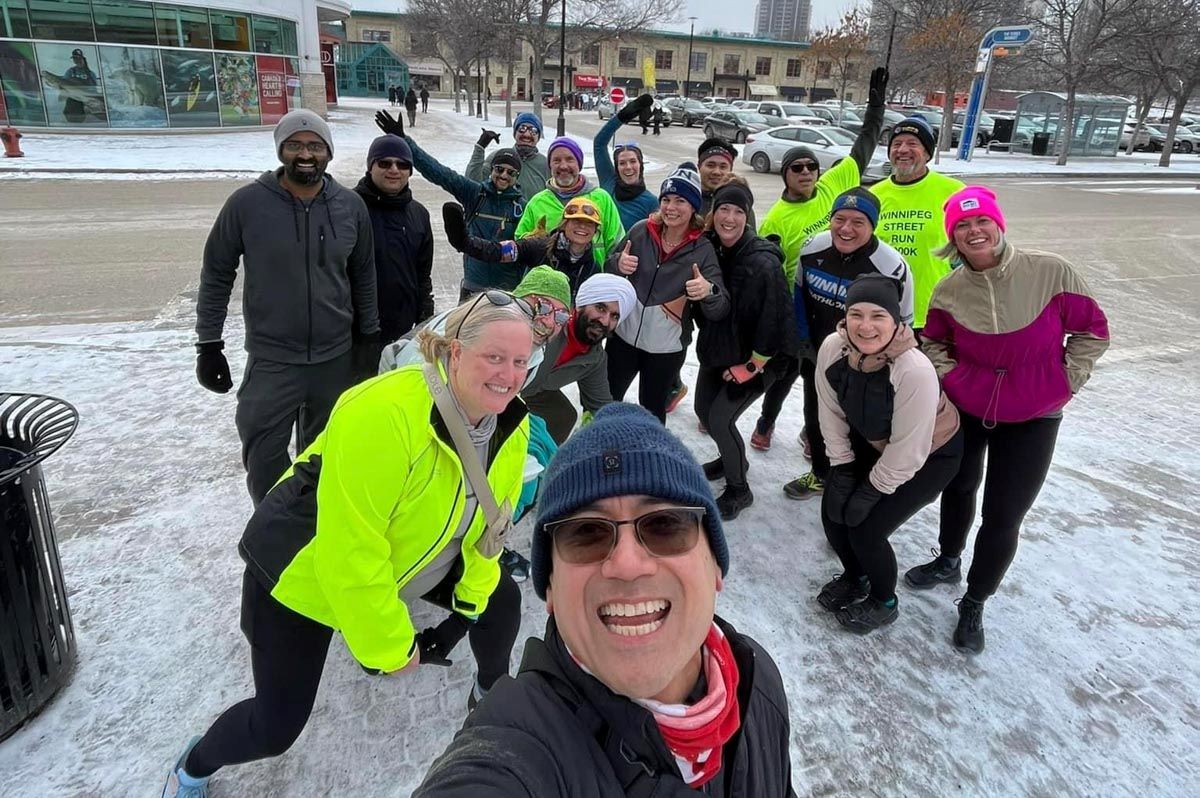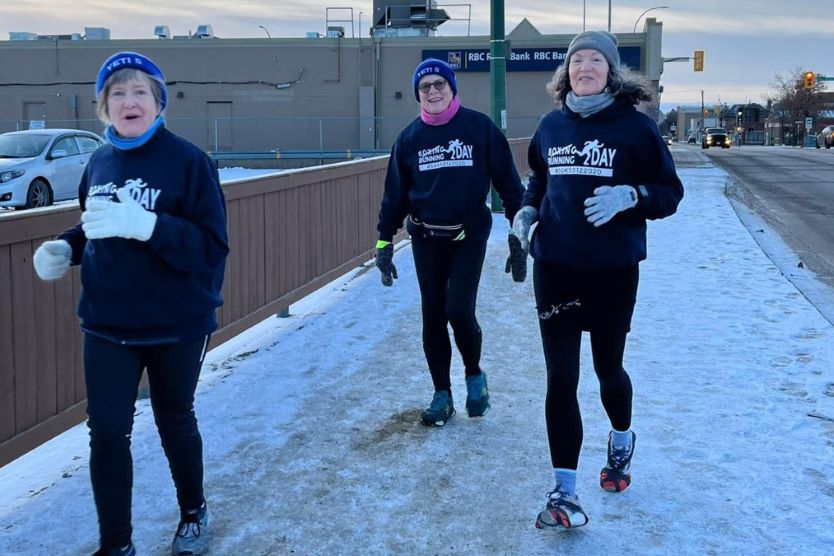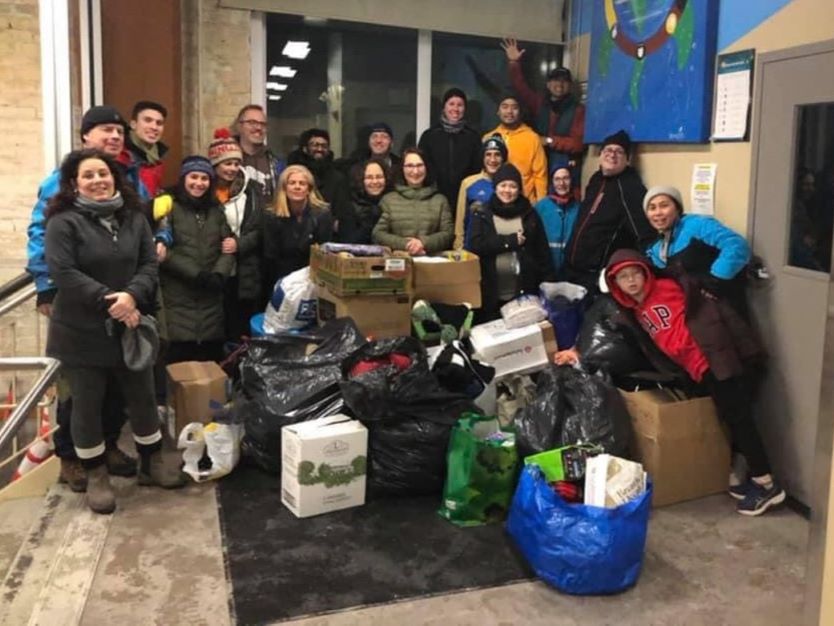Junel Malapad wants you to change Boxing Day on your calendar to Running Day. Instead of going shopping on December 26 to cash in on the big deals, as is the tradition in Canada and other Commonwealth countries, he wants you to get outside for a run. And if you have any inkling of turning your Running Day run into a fundraiser for a charity and inviting your friends to come along, he would be beyond happy to have you join in what has become his decade-long tradition.
This year, on the morning of December 26, Malapad will gather with a group of friends in The Forks area in Winnipeg, Manitoba, and run a 3.3-kilometer loop for 12 hours to raise money for the Siloam Mission, a shelter for the unhoused in Winnipeg. What started as a personal challenge in 2015 has grown into a grassroots event that sees over 100 people join Malapad on his run, and has raised more than $112,000 for Siloam Mission. It has also garnered countless donations of products the shelter needs to house people.

Junel Malapad with a group who have converged for a Running Day run. All photos courtesy of Junel Malapad.
Malapad’s journey into running and fundraising is unexpected at best, but what started as a scolding from his doctor to improve his health and lifestyle if he wanted to combat high cholesterol has led to the growth of a community-wide fundraising event that encourages people to get outside and move their bodies instead of going shopping for post-holiday deals.
Running for Health
Malapad didn’t start running until he was 38 years old. Working as the Head Caretaker for the Winnipeg School Division Number One, he had high cholesterol and a family history of a variety of health problems, including cancer and heart issues.
His family immigrated to Winnipeg from the Philippines in 1973 when Malapad was three, and he grew up in the area with two brothers and three sisters. He started as a caretaker at the school district in 1991, working at the smallest school, and says he was “in charge of keeping the school clean, secure, and sanitized.” By the time he retired during the COVID-19 pandemic, after 29 years at the job, he’d moved himself up to the largest school in the district.
But throughout the years, Malapad’s health wasn’t great, and his family doctor, who’d cared for both of his parents, wasn’t afraid to tell him so. Malapad says, “My doctor scolded me, ‘You need to do something different!’” He was prescribed cholesterol-lowering pills and given a stern warning about the likely fate of his health if he didn’t change something.
Malapad says the warning took hold, and said, “I wanted to live longer and nip that in the bud.” So, he picked up running, but he admits, “I didn’t like it very much.” He soon discovered that his co-worker at the school, Virgilio Galvez, was also a runner. And, when he mentioned the medication the doctor gave him to control his cholesterol, Galvez was quick to say, “You don’t need those pills. Just come run with me.” And so, the pair, who worked evenings in the school, started running together regularly during the day.
Running Inspiration
In 2015, a few years into his running journey, Malapad learned of Edward Dostaler. The 26-year-old Canadian was running across the country — twice — to raise money for breast cancer and Alzheimer’s disease organizations. As part of his run, he’d stop in some cities and run laps in an area for 24 hours, to raise awareness of the causes he was raising money for. Intrigued, Malapad shared some night miles with him when he stopped in Winnipeg in May.
Of the encounter, Malapad says, “I learned of why he was doing it … and when you spend some time with someone doing something wonderful, and hard, like that … it’s a ripple effect.”
Malapad says, “His idea really resonated with me,” and the seed was planted. Not long after the encounter, two students in Malapad’s daughter’s school died by suicide, and looking for some way to help, he thought maybe he could do something with his running. He set out to raise money for the Canadian Mental Health Association, which provided mental health services for schools in the area. He says, “I could use my running, just like Edward Dostaler, to raise money for programs for these schools.”
He decided to do laps of the hill in Westview Park, an old garbage dump that had been covered and converted into a park. He ran 45 kilometers up and down the 60-foot hill and called it Trash Stigma, a nod to removing the stigma around mental health. It was his first foray into using his running to help others, and he continues the event as an annual tradition in its 10th year. It’s recently been renamed Mindful Movement for Mental Health.
For his 40th birthday, Malapad invited his friends to run for four hours with him in a local park. He used the event as a fundraiser for CancerCare Manitoba and ended up running 40 kilometers. His father had passed away from cancer, and the cause felt close to his heart. His group raised $3,000 for the organization.
Change Boxing Day to Running Day
Boxing Day has its origins in the Victorian era of Britain when the aristocracy would box up any leftovers from their Christmas meal and give them to the people who worked for them so that they could have their own holiday with their families. The holiday came from a tradition of giving, and like many other holidays with similar origins, Boxing Day has become a shopping holiday in many places.
While Malapad admits that he was once a person who lined up overnight to score deals on Boxing Day sales after the holidays, his new interest in running was drawing him in a different direction.
In 2015, he called up a few friends with an idea, saying, “I want to run for 12 hours on Boxing Day because I don’t like to shop,” and invited people to join him. Initially, there were few takers. The forecast was for extreme cold, -45 degrees Celsius — which translates to almost the same in Fahrenheit — and blue skies. Despite the cold, a few friends joined the day.
When Malapad was nearing 80 kilometers around his 12-hour mark, he got a call from a friend hoping to join after he got off work. Malapad says that he figured, “Let’s just round it up to 100 kilometers,” so that his friend could join, and he ended up running for 16 hours that day.
Nearly 10 years later, he laughs at the absurdity of the day, “Because 16 hours in negative 45 is fun, right?”
The run was just a fun personal challenge until he learned that an unsheltered man had frozen to death in a bus shelter in Winnipeg. Malapad says his reaction was, “I felt like people shouldn’t be freezing to death in a city that is well-populated,” and he decided, “Something needs to be done about this.”
Supporting the Siloam Mission
Malapad learned of the Siloam Mission, a shelter for the unhoused, and approached them with his plan to run 100 kilometers on Boxing Day as a fundraiser for the shelter. He says he told them, “I’m really happy to support what you guys do.”
Christmas Day of 2016 brought a blizzard, and the morning of Boxing Day brought a dead-quiet city with cars snowed in and streets unplowed. Malapad had planned a 100-kilometer loop around Winnipeg, starting about 10 kilometers from his house. Instead of driving, he had to walk, helping others push their cars out of the way. He says of that morning and of the entire run, “The streets weren’t cleared at all. I had to trudge through snow knee-deep.”
But three others showed up at the meeting spot, and while the 100 kilometers took him long enough that his wife was worried about him, he completed the challenge. He goes on to explain, “My aid stations were malls,” and he went and visited meaningful places in the city, including Westview Park, the location of his Trash Stigma run. Reflecting on it, Malapad says, “That day was really special.”
After doing another 100-kilometer loop around the city in 2017, in 2018, Malapad changed his big loop format into smaller 3.3-kilometer loops around The Forks area at the intersection of the Red River and the Assiniboine River. His car was his aid station, and people could come and go as they pleased, running or walking as much or as little as they wanted. That year, he ran 73 laps for 150 miles in 56 hours, and continued to raise money for Siloam Mission.
Learning to Do Hard Things Alone
In 2020, the year Malapad was to turn 50, he decided to run 50 kilometers 50 times throughout the year, which comes out to a 50k almost every weekend, with just two weekends off. He’d use the challenge to raise money for 12 different organizations, one per month.
The year started as planned, with Malapad having a friend join for the long weekend runs. They would start at 2:30 a.m. so he could join his weekly run group, the Winnipeg Run Club, for the last 10k of every 50k. He says, “That was really motivating for me to run with a huge group of people for the last 10 kilometers.”
And then, the world shut down with the COVID-19 pandemic, and all of the parks Malapad was using for bathrooms and water during his runs were closed. Social distancing regulations meant he couldn’t run with friends, and for a second, Malapad thought maybe he needed to abandon the project. Instead, he moved it close to home, running laps around his neighborhood and using his house as an aid station.
As someone who thrived on the social aspect of running, Malapad says of the experience, “I learned I could do really hard stuff by myself instead of relying on other people to motivate me.” He ended up raising more than $20,000 for organizations ranging from the YMCA to the Heart and Stroke Foundation of Canada, and says, “That year was very special.”
Seeing the Impact
When it comes to choosing organizations to support, Malapad says, “A lot of things I raise money and awareness for are things that could happen to me, or could happen to my friends and loved ones.”
He describes how after one of his Running Day — formerly Boxing Day — runs, he and his friends from his running group took seven or eight cars full of donations of everything from clothing to toiletry items, plus the money they had fundraised, directly to the shelter.
Malapad gets emotional when he describes the scene he saw, “I looked around, and there were more than 400 people on Boxing Day with no place to stay, and they were being served warm meals.” He could see the very direct impact that his running had on people’s lives. He says, “I’m very happy I’m able to help that way.”
In the nine years since Malapad turned Boxing Day into Running Day, he’s raised more than $112,000 for the Siloam Mission.
Inviting Others to Join
Malapad is modest about his impact on the running community he’s a part of. He says, “I just organize me doing something, and people come and share the experience. And some people surprise themselves and don’t expect to be running 10, 12, 48 hours, and they get all involved in it. It’s just amazing. People walk, people run, I have a friend in a wheelchair who wheels.”
The impact is clearly far-reaching, and Malapad now has people around the world doing their own version of Running Day in their local areas.
He says of his Running Day tradition, “It’s a great motivator to get outside and support our community and support the unsheltered people in our community.”
Malapad has no intention of turning his event into anything more official than a grassroots run amongst friends, but he’d love to see the tradition grow in other areas. He says, “I just want people to do some grassroots runs on their own, and if they have the ability to make it something phenomenal, take it and go.”
Call for Comments
- Have you heard of Junel Malapad and his Running Day fundraising?
- Does this sound like something you could get involved in?





